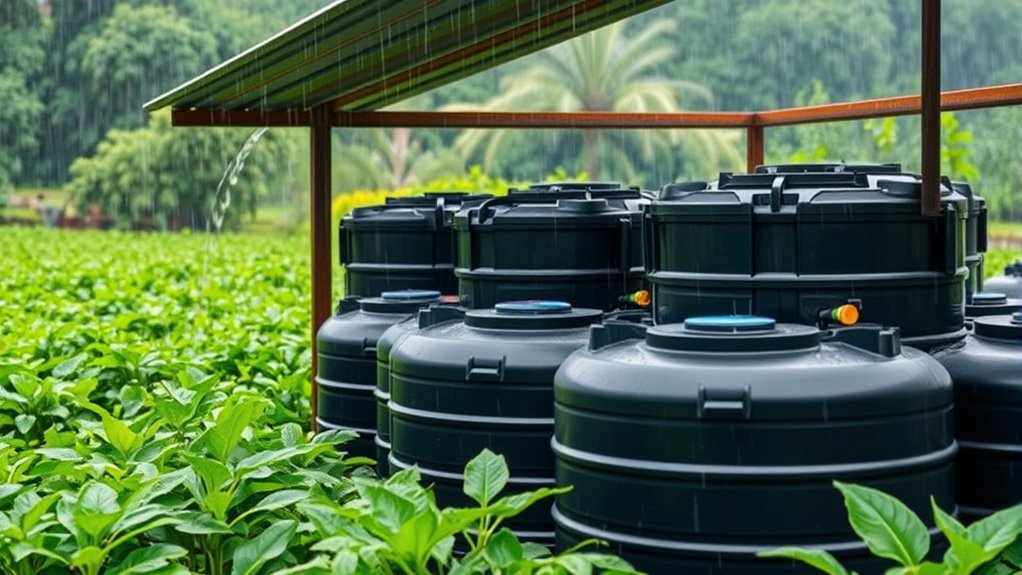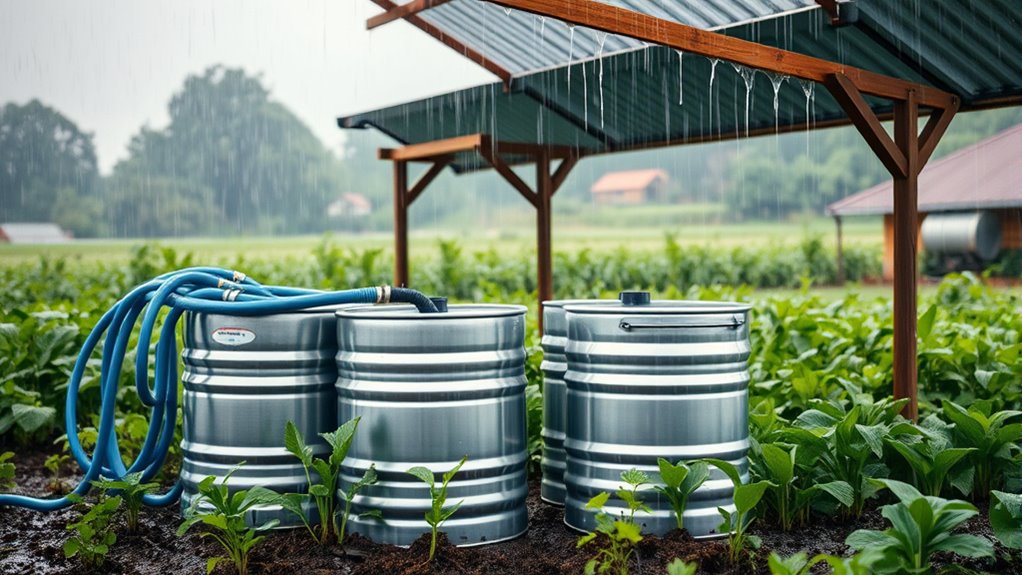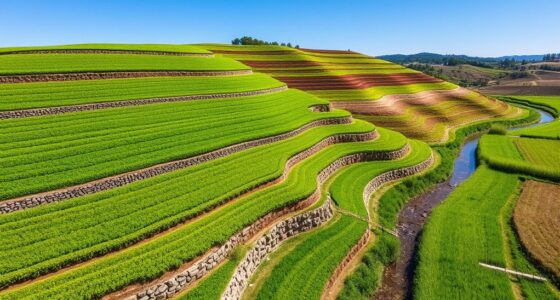To optimize rainwater harvesting on your farm, set up mesh screens on gutters and install first-flush diverters to remove debris, ensuring clean water. Regularly inspect and clean your tanks to prevent leaks, rust, and algae buildup that can compromise water quality. Use filters and sterilization methods like UV or chlorination for safety. Monitoring water levels and system performance helps avoid shortages. Keep these practices in mind to create a sustainable water system—more tips follow to help you succeed.
Key Takeaways
- Install mesh screens and first-flush diverters to ensure clean rainwater collection free of debris and large particles.
- Regularly inspect and maintain water tanks, including cleaning and sealing entry points to prevent contamination.
- Use filtration, UV sterilization, or chlorination to improve water safety for crops, livestock, and drinking purposes.
- Monitor water levels with gauges or float valves, and automate systems to prevent overflows or shortages during dry periods.
- Seek expert advice and evaluate system performance regularly for optimal rainwater harvesting efficiency and water quality.

Rainwater harvesting and water storage are fundamental strategies for sustainable farming, especially in areas prone to drought or irregular rainfall. When you collect rainwater, it’s essential to ensure that the water you use is clean and safe for your crops and livestock. This means paying attention to rainwater filtering. Proper filtering systems remove debris, leaves, and potential contaminants before water enters your storage tanks. Installing mesh screens on gutters and first-flush diverters helps eliminate larger particles and reduces the risk of clogging. You might also consider installing finer filters at the inlet to your water tanks to catch smaller particles. Regularly checking and cleaning these filters guarantees they don’t become clogged, maintaining efficient flow and good water quality.
Water tank maintenance becomes just as critical as effective rainwater filtering. Over time, tanks can accumulate sediment, algae, or other residues that compromise water quality and system efficiency. You should routinely inspect your tanks for cracks, leaks, or signs of rust, especially if they’re made of metal. Cleaning the tanks periodically is crucial—drain them completely, scrub the interior walls, and rinse thoroughly before refilling. This prevents the buildup of algae and bacteria, which can thrive in stagnant water. Additionally, sealing any entry points helps keep out pests and debris, further protecting your stored water. Proper maintenance extends the lifespan of your tanks and guarantees your water remains safe for use. Incorporating regular inspections into your routine can prevent costly repairs and ensure consistent water quality. Moreover, implementing water testing protocols periodically helps verify water safety and quality standards are maintained. Additionally, water quality can be significantly improved with proper filtration and maintenance, which also benefits the health of your livestock and crops. To enhance the effectiveness of your system, it’s also advisable to consider professional consultation for optimal setup and ongoing care.
Beyond filtering and basic tank care, you should also monitor water levels regularly to avoid overflows or shortages. Installing gauges or float valves helps you keep track of storage levels and automate water supply to your farm. During dry seasons, consistent water levels become even more essential, so ensure your system can handle fluctuations without losing efficiency. When storing rainwater, consider implementing simple treatment methods such as UV sterilization or chlorination if you plan to use it for drinking or livestock. These additional steps improve water safety and reduce health risks. Moreover, studies show that indoor air quality can be significantly improved through proper maintenance and filtration, which can be crucial for farm workers’ health. Regular upkeep of your rainwater harvesting system not only ensures reliable water supply but also promotes a healthier and more sustainable farming environment.
Frequently Asked Questions
What Are the Best Rainwater Harvesting Systems for Small Farms?
For small farms, you should consider simple, efficient rainwater harvesting systems. Installing a rain garden design helps capture runoff and improve water infiltration. Coupling this with a drip irrigation system ensures your plants get consistent, efficient watering, reducing waste. These methods are easy to set up and maintain, making them ideal for small-scale farming. You’ll optimize water use and boost your farm’s sustainability with these practical solutions.
How Do I Ensure Water Quality in Storage Tanks?
To guarantee water quality in your storage tanks, start by choosing the right tank material, like food-grade plastic or stainless steel, to prevent contamination. Regularly test the water using water testing kits to check for bacteria, pH levels, and pollutants. Keep the tank clean by removing debris and inspecting for algae or sediment. Proper maintenance and monitoring help keep your stored water safe and clean for farm use.
What Are the Legal Regulations for Rainwater Harvesting in My Area?
Imagine your farm’s water future as a carefully woven tapestry—every regulation a vital thread. You need to check local laws to guarantee legal compliance and understand permitting requirements before installing rainwater harvesting systems. Regulations vary; some areas may require permits or specific water quality standards. By proactively researching and adhering to these rules, you safeguard your farm and assure sustainable, legal water use. Always consult local authorities for the most accurate guidance.
How Can I Maintain and Clean Water Storage Systems Effectively?
You should regularly perform tank maintenance by inspecting for cracks, leaks, and buildup. Clean the interior surfaces periodically to prevent algae and sediment accumulation. Use water filtration systems to make certain the stored water stays clean and safe for use. Keep the filtration components in good condition and replace filters as needed. Staying consistent with these steps helps maintain water quality, extends the lifespan of your storage system, and ensures safe, reliable water supply.
What Are Cost-Effective Options for Farm Water Storage Solutions?
When choosing water storage solutions, you want cost-effective tank options that fit your budget. Consider affordable storage solutions like plastic or polyethylene tanks, which are durable and easy to install. You might also look into repurposing existing containers or underground tanks to save costs. By comparing prices and selecting the right size, you’ll guarantee reliable water storage without overspending, helping your farm stay efficient and prepared.
Conclusion
By embracing rainwater harvesting and water storage, you’re planting seeds of sustainability that flourish with each rainfall. Think of your farm as a fortress, collecting precious drops like hidden treasure—turning fleeting rain into a reliable source of life. With every drop stored, you’re weaving a resilient web of water security, ensuring your farm thrives through storms and sunshine alike. Harness the rain, and let your farm blossom like a well-tended garden of abundance.










